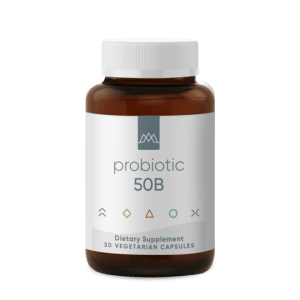Over the past few decades, research has shown how the gut can impact your overall health and wellbeing. Gut health plays a role in your mood, vibrant skin, heart health, and even your weight.[1]
Underlying gut health is trillions of bacteria, which reside within the gut. These bacteria play critical roles in many processes, including digestion and immunity.[2] A wall keeps the gut intact. This thin layer of cells forms the first physical barrier that separates the contents of the gut from the bloodstream.
This gut barrier allows nutrients to cross into the bloodstream while preventing potentially harmful small molecules and organisms from leaving the gut. Proteins called tight junctions to form a “glue” that keeps these cells sealed.[3]
What is Leaky Gut?
A healthy gut depends on the correct balance between favorable and unfavorable bacteria. When that balance becomes disrupted, a condition called dysbiosis results.
This imbalance between favorable and unfavorable bacteria can loosen up the tight junctions that keep the gut wall intact. Harmful substances can then leak into the bloodstream, creating increased intestinal permeability or leaky gut.[4]
These particles –– partially digested food but also things like toxic digestive metabolites and bacterial toxins –– can then travel throughout the body, even slipping into the brain.
Numerous things can disrupt the balance of gut bacteria and make the gut wall “leaky,” including:
- The standard American diet, which is low in fiber and high in sugar
- Alcohol
- Non-steroidal anti-inflammatory drugs (NSAIDs) such as ibuprofen [5]
- Chronic stress [6]
- Over-using antibiotics [7]
- Infections such as Helicobacter pylori, a bacterium that infects the stomach [8]
- Environmental toxins
How the Body Responds to Leaky Gut
Leaky gut can create gut-related conditions including celiac disease, Crohn’s disease, and irritable bowel syndrome. These repercussions go beyond the gut, impacting the entire body. Among those reactions include:
- An immune response. The immune system doesn’t recognize these partially digested food particles and other things that slip through the gut wall, so it attacks them.
- Chronic inflammation. As the immune system stays fired up, inflammation simmers. Over time, chronic inflammation can impact your entire body and contributes to nearly every disease.[9] [10]
- Food sensitivities. Imbalances in gut bacteria can create food sensitivities, where specific foods can trigger a reaction with bloating, gas, diarrhea, abdominal pain, and nausea.[11]
- Autoimmune disease. Particles that slip into the bloodstream can lodge in specific areas, such as joints. The immune system can mistakenly attack these tissues, which can lead to autoimmune diseases.[12]
“All disease begins in the gut,” Hippocrates said about 2,500 years ago. What impacts the gut can go on to impact the entire body, including the brain. Scientists have connected leaky gut with conditions including autistic spectrum disorder, dementia, depression, schizophrenia, and other brain disorders.
Leaky gut can play a role in a wide range of diseases, including diabetes and obesity.[13] It can even impact sleep by inhibiting the production of melatonin, a hormone that regulates circadian rhythm.[14]
5 Ways to Support Gut Health
What you eat and how you live can dramatically impact gut health. While leaky gut and other gut conditions sometimes require working with a healthcare practitioner, these five strategies can support the right balance of gut bacteria and keep the gut healthy.
- Eat gut-supporting foods. Foods rich in probiotics support the growth of healthy gut bacteria. Kimchi, sauerkraut, and unsweetened Greek yogurt are excellent probiotic-rich foods. Leafy and cruciferous vegetables, low-sugar fruits like berries and avocados, and nuts and seeds provide dietary fiber, including prebiotic fiber, which feeds probiotics.[15] Our Advanced Plan eliminates gut-unfriendly foods and incorporates anti-inflammatory, gut-healing foods.
- Try an elimination diet. If you suspect food sensitivities could be contributing to leaky gut, consider a short-term elimination diet, where you remove a particular food or foods for two to four weeks and see if your symptoms improve. If you reintroduce that food and symptoms reappear, you know what could be creating these problems.[16]
- Manage stress levels. The wide-ranging impact of chronic stress impacts nearly every aspect of health, including the gut. Learn 16 ways to manage stress here.
- Minimize Toxins. A good place to begin minimizing the pesticides and other toxins that contribute to leaky gut is with your food. The Environmental Working Group (EWG) provides a Shopper’s Guide to Pesticides in Produce. Make more informed cosmetics choices with the EWG’s Skin Deep® guide. Avoid harsh cleaning chemicals and save money with natural cleaning solutions.
- Get the right nutrient support. Probiotics reinforce the intestinal barrier by increasing tight junction proteins and supporting other intestinal cells. These living organisms maintain the balance of gut bacteria and suppress the growth of harmful bacteria. Probiotics also support the immune cells within the gut.[17]
A probiotic supplement makes a convenient, effective way to get beneficial amounts of the healthy gut flora that helps restore the balance of gut bacteria and supports overall gut health. That’s why we created Probiotic 50B.
This broad-spectrum formula contains a diverse blend of the most highly-researched probiotics to support a healthy gut, immune system, and more in just one easy-to-swallow capsule daily.
When it comes to buying probiotic supplements, quality matters. These supplements are living organisms that have many barriers to cross, including shelf life and surviving the acidic conditions of the stomach.
Probiotic 50B delivers a powerful blend of healthy gut bacteria in a moisture-resistant capsule featuring delayed-release technology. This ensures the capsule delivers all of the healthy bacteria to support a healthy gut, immune system, and so much more. Our capsules are non-GMO, dairy-free, and gluten-free.
Never modify or discontinue any medication without the consent of your healthcare practitioner.
References
[1] https://www.webmd.com/digestive-disorders/ss/slideshow-how-gut-health-affects-whole-body
[2] https://www.kenhub.com/en/library/anatomy/neurotransmitters
[3] https://www.ncbi.nlm.nih.gov/pmc/articles/PMC6313445/
[4] https://www.medicalnewstoday.com/articles/326102
[5] https://www.nhs.uk/conditions/leaky-gut-syndrome/
[6] https://www.nature.com/articles/s41598-017-11069-4
[7] https://www.ncbi.nlm.nih.gov/pmc/articles/PMC5725362/
[8] https://www.ncbi.nlm.nih.gov/pmc/articles/PMC5440529/
[9]https://www.healthline.com/nutrition/does-all-disease-begin-in-the-gut#inflammation
[10] https://www.ncbi.nlm.nih.gov/books/NBK493173/
[11] https://www.healthline.com/health/gut-health#signs-and-symptoms
[12] https://www.ncbi.nlm.nih.gov/pmc/articles/PMC5440529/
[13] https://www.ncbi.nlm.nih.gov/pmc/articles/PMC6996528/
[14] https://www.psychologytoday.com/us/blog/sleep-newzzz/201601/unlocking-the-sleep-gut-connection
[15] https://www.medicalnewstoday.com/articles/326102#foods-to-eat
[16] https://www.health.harvard.edu/diseases-and-conditions/how-to-deal-with-food-sensitivity



